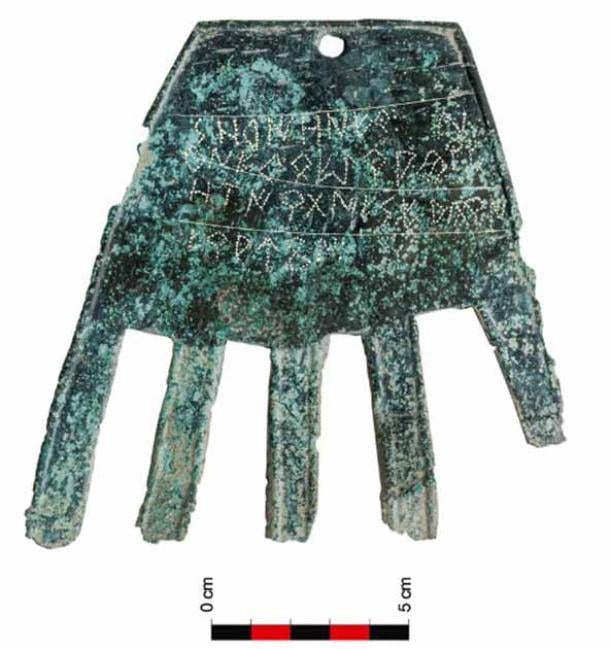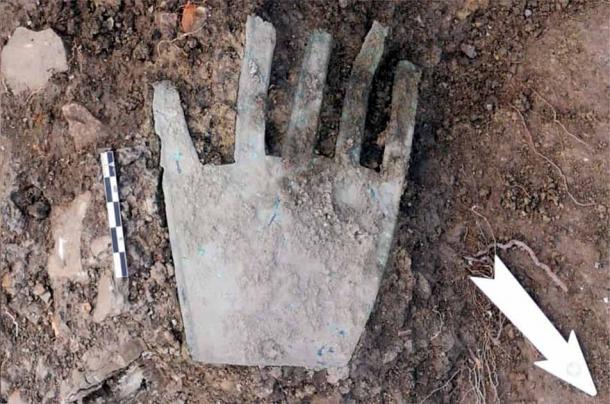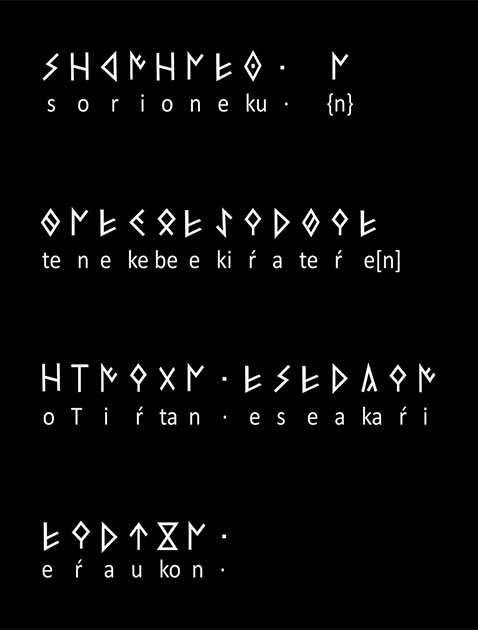PAMPLONA, Spain – Spanish researchers believe they have begun deciphering an inscription on an ancient artifact that may hold clues to the origin of the Basque language, Euskera. The first translated word is “sorioneku” or “good fortune.” In modern Basque, it would be spelled “zorioneko.”
The artifact called Hand of Irulegi was uncovered by Spanish archaeologists of the Aranzadi Science Society in the summer of 2021 in the municipality of Laquidáin in the Aranguren Valley near Pamplona, Spain in the province of Navarre. The site itself was a hillfort called Irulegi. The region has numerous ancient sites with legends connecting it to witchcraft.
The relic is bronze and dates back some 2,100 years to the First Century BCE and the Vascones, a tribe from whom the Basque inherited their name, inhabited the region of the upper Ebro river in the western Pyrenees that covers the modern-day province of Navarre, northeastern Rioja, and western Aragon.

Irulegiko eskua – The Hand of Irulegi – Courtesy [Nafarroako Gobernuaren irudi galeria/ Government of Navarre gallery]
The Vascones bordered the Celtiberians, a group of Celts and Celticized people on the central and northeastern Iberian peninsula. Roman classical authors such as Livy and Pliny the Elder attested to the tribe’s presence.
Livy identifies the tribe and location when he writes about the Sertorian war in 76 BCE in Hispania. Though contested, the Greek geographer Strabo writing during the reign of Rome’s first emperor Caesar Augustus, identified cities in the region, “Both cities, Kalágouris, one of the main cities of the ouáskones [Vascones],… This same region is crossed by the road that comes from Terrakon and goes to the ouáskones [Vascones], in the border of the Ocean, to Pompélon and Oiáson, city built above the very same Ocean.” Some 15 different cities were later reported by subsequent authors and historians.
The Basque language, or Euskara, itself is considered a language isolate, meaning it is unrelated to another existing language. Euskara is presumed to be the last remaining descendent of one of the Pre-Indo European languages of prehistoric Europe. Little is known about the origin of the language other than the modern language emerged from an earlier form also spoken in the same region.
Today, Euskara is spoken by about 1.1 million people, mostly in the Basque Country that ranges from Spain and France but also Argentina, Chile, Colombia, Cuba, Mexico, and the United States where the high concentration of speakers is in Boise, Idaho. The Basque language may have given the state of Arizona its name, haritz ona meaning “good oak.”

Irulegiko eskua – The Hand of Irulegi as it was being excavated [Courtesy: Government of Navarre]
As for the relic, the importance of the find was shared in a news conference by archaeologists Mattin Aiestaran, director of the Irulegi excavation; and Berta Balduz, a restorer from the Government of Navarra.
The linguistic importance of the discovery was addressed by Joaquín Gorrochategui, an expert in Paleolinguistics and professor of Indo-European Linguistics at the University of the Basque Country, and by Javier Velaza, an expert in epigraphy and professor of Latin Philology at the University of Barcelona.
“The Hand of Irulegi is undoubtedly the first document written in the Basque language and in a specifically Basque script, as well as being the longest text known to date,” said Velaza.
The Hand of Irulegi measures 14.5 centimeters (~5.7 inches) long and has 40 symbols marked across four lines. They are suspected to be five words.

Transcription of the text on Irulegiko eskua – The Hand of Irulegi [Courtesy: Nafarroako Gobernuaren irudi galeria/ Government of Navarre]
Until this discovery, scholars and researchers had presumed that the Vascones had no proper orthography or written language. To date, only a few words written in the Latin alphabet had been found on coins. But the five words that are written on the Hand of Irulegi clearly show otherwise including a separate orthography.
“People spoke the language of the Vascones in the area where the inscriptions were found,” Velaza said.
“We had imagined that to be the case but until now, we had hardly any texts to bear that out. Now we do – and we also know that the Vascones used writing to set down their language … This inscription is incontrovertible; the first word of the text is patently a word that’s found in modern Basque.”
Gorrochategui added, “This piece upends how we’d thought about the Vascones and writing until now” He continued, “we were almost convinced that the ancient Vascones were illiterate and didn’t use writing except when it came to minting coins.”
The thrill about the find was described as palpable and contagious enough that Velaza advised against excited speculation. “I think we should be excited – but we should still be very rigorous scientifically speaking,” he said.
Aiestaran commented that the Hand might owe its survival to the Sertorian Wars because the village where the Hand was likely displayed over a door was burned and its ashes covered the relic.
But the Hand does give clues about the past, “it means we have a snapshot of the moment of the attack,” said Aiestaran. “That means we’ve been able to recover a lot of day-to-day material from people’s everyday lives. It’s an exceptional situation and one that has allowed us to find an exceptional piece.”
Velaza did note “that doesn’t mean we know how long the Vascones had been there, nor what their future was after that moment.”
The Hand may hold lost linguistic knowledge but is not yet revealing all its secrets. Researchers are extracting other recognizable chunks of text from the Hand that suggests the modern Basque adverb for negation, “ez,” and the state of being “egin.”
However, after that first word, the researcher said the remainder of the text doesn’t match any known Basque names or Paleohispanic gods. But that isn’t surprising given the dearth of knowledge about the Vascones.
As for who actually pulled the Hand from the earth, the honor went to Aranzadi Science Society volunteer Leire Malkorra. She said, “It looked like the little wings on the helmet of Astérix,” referring to the comic book character in a well-known series about a village of Gaulish warriors fighting the Roman Republic.
Malkorra added, “When they told me what it was, tears flooded my eyes.”
The Wild Hunt is not responsible for links to external content.
To join a conversation on this post:
Visit our The Wild Hunt subreddit! Point your favorite browser to https://www.reddit.com/r/The_Wild_Hunt_News/, then click “JOIN”. Make sure to click the bell, too, to be notified of new articles posted to our subreddit.